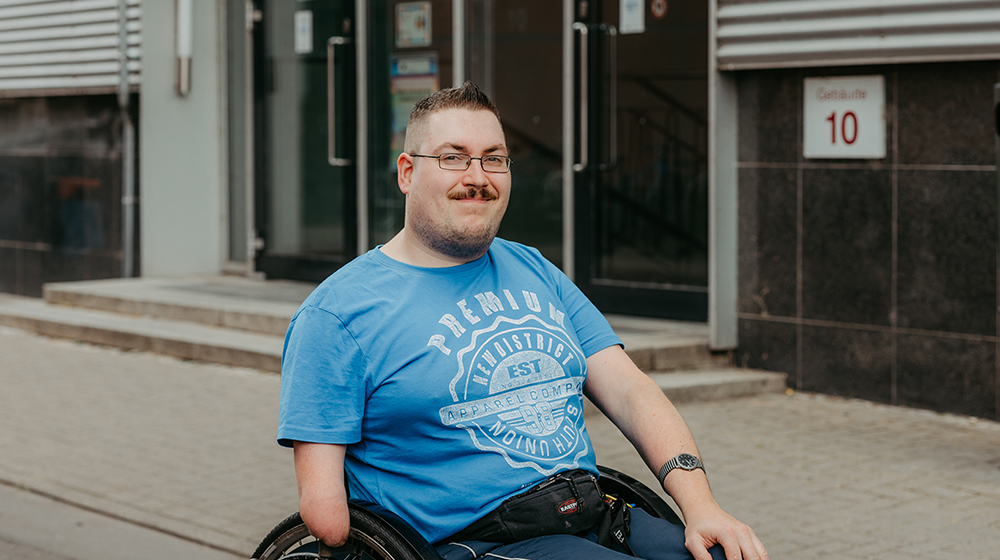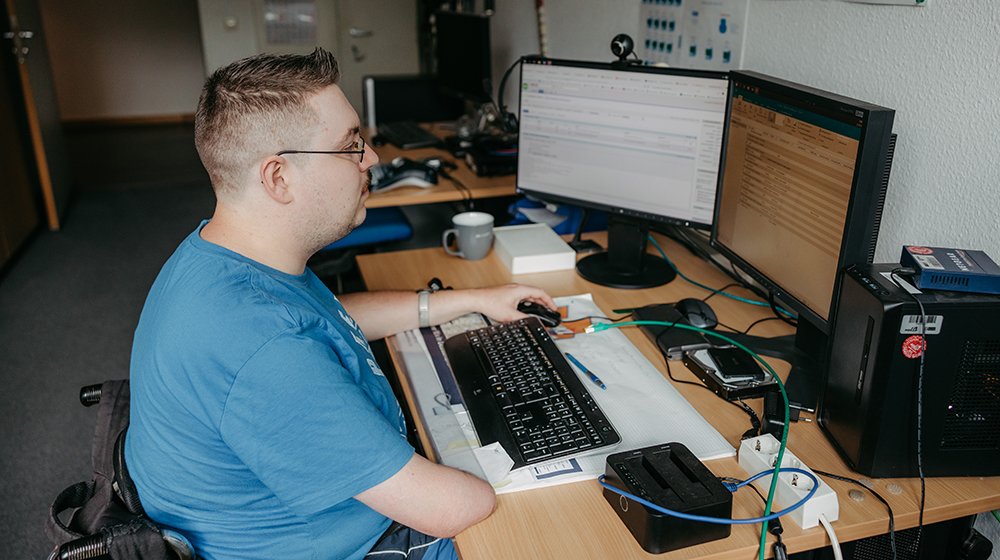
Take a moment to think about your commute to work, especially to campus! Do you have to take stairs to reach your building or office? Would there theoretically be the option of using an elevator? These are questions that I, for one, have never asked myself and don't have to - since I don't rely on a wheelchair, unlike Matthias Scheer. He works on the second floor of Building 10 in the IT department for the Faculty of Mechanical Engineering. And that's exactly where I visited him once! Walking into his office, I notice absolutely nothing out of the ordinary. There is a table with a computer, a mouse and a keyboard. Everything as I know it from my own desk. However, the daily work routine probably holds more challenges in store for the IT employee, because Matthias Scheer is also missing a hand. Something that Matze, as he introduces himself with a laugh, does not cause to be in a bad mood, however.
"I've been working at the university since 2014, I even did my IT specialist training here at the university computer center before that," he says. The road to get there wasn't an easy one for him, though. "Before that, I was trained as an office administrator. But that wasn't really my thing and I didn't find a job. And then I spent four years going from one employment agency measure to the next." His career aspiration, however, had always been to work with computers. "But at the employment agency, they didn't think I could do that because I'm missing one hand. But that's not a problem at all. I work here with a 'normal' keyboard and mouse - I'm easy to take care of," he says with a laugh. And that's exactly the impression I get when I see Matthias Scheer working on the computer. It's as if he has found exactly what he enjoys doing and as if his impairment doesn't bother him at all.
An (almost) normal working day
His workday begins at 6:30 a.m. "The first thing I always do, of course, is turn on my computer and see if I have any messages from people who need help with IT problems, such as no network or no screen picture," he says with a smile. And Matthias Scheer also sometimes faces - fortunately not always - everyday problems, to return to the elevator from the beginning: "Nothing works without an elevator, and it certainly happened once in a while that it was broken. Then I had no choice but to turn around, get back in the car and work from home."
 Matthias Scheer working at a computer in his office (Photo: Jana Dünnhaupt / Uni Magdeburg)
Matthias Scheer working at a computer in his office (Photo: Jana Dünnhaupt / Uni Magdeburg)
In the end, he says, it comes down to this: "I can do a lot, but not everything. I can't get to my office if the elevator breaks down. I can't lift heavy equipment by myself. But I don't feel like it's a problem because I have many nice colleagues who help me," says the university employee, describing his situation. "They help me overcome even the biggest obstacles, such as the stairs in front of Building 23," he says with a laugh. There, he says, he walked slowly up the stairs with support, and his colleagues carried his wheelchair up when the team was once invited to a workshop in the building. "My motto is: I'll try to do it on my own first, but if I really can't, then I either need help or someone needs to take over for me."
And this little story underlines exactly what I also noticed when I looked at the campus map once before visiting him: Nearly every building on the main campus has a reference to wheelchair access. However, when I took a closer look, I also noticed a lot of little asterisks. These indicate that many buildings are only partially accessible - and thus partly inaccessible for people who depend on a wheelchair.
Matthias Scheer's assessment is that Magdeburg University is about 70 percent wheelchair accessible. "I'm satisfied with the way things are, but there's always a little room for improvement." Apart from the stairs, the paths are also very important for people who depend on a wheelchair. Cobblestones are a real problem. As well as curbs that are too high. "But I'm very happy to work at the university and also that I had the chance to realize my career aspirations here - I hope I can continue to work at the university for a long time and that the elevator in Building 10 always runs," the university employee says with a laugh.
